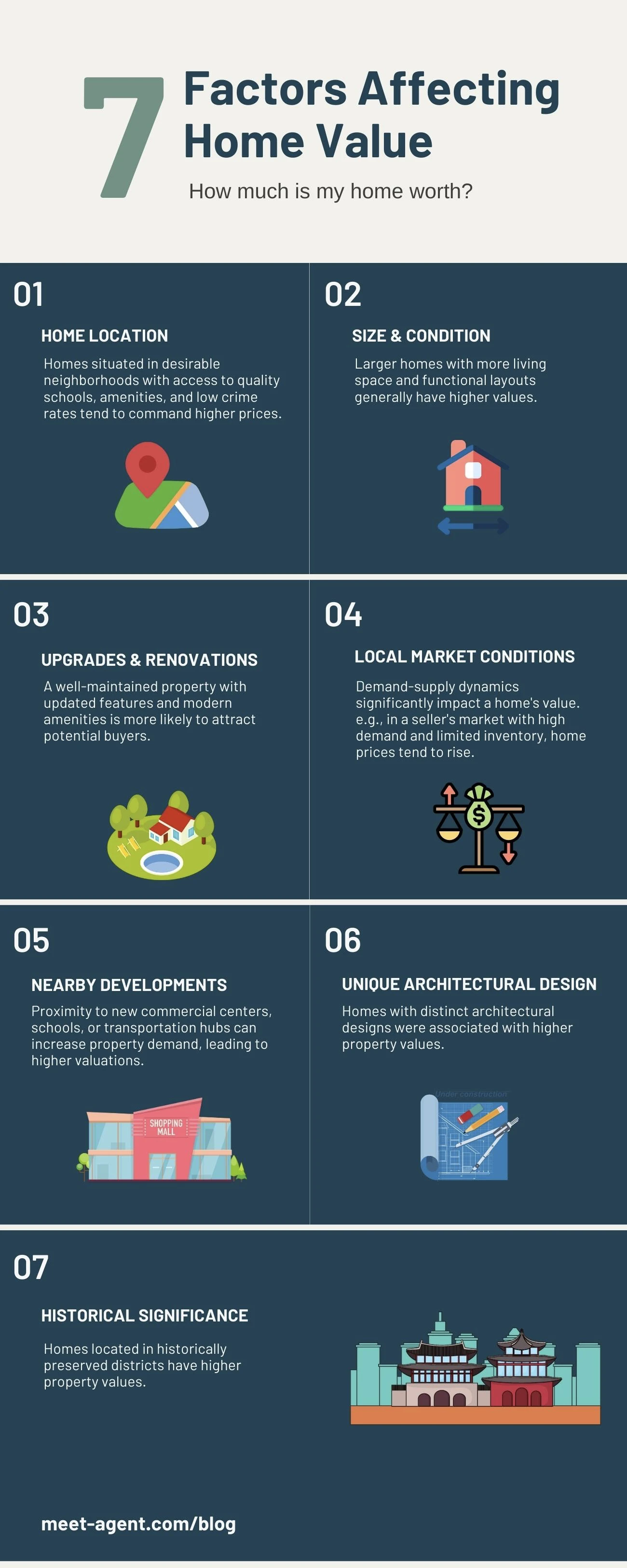How Much Is My Home Worth?
As a homeowner, understanding the true value of your property is essential for making informed financial decisions. Whether you are contemplating selling your home, refinancing your mortgage, or simply gaining a comprehensive picture of your financial standing, accurately determining the worth of your home is paramount.
The process of evaluating a property's value can be both intricate and consequential, as it directly impacts significant financial transactions. For instance, knowing your home's value is crucial when deciding on an appropriate listing price if you plan to put it on the market. According to National Association of Realtors, setting an optimal listing price can reduce the time a property stays on the market and increase the likelihood of attracting potential buyers. Additionally, when considering refinancing, an accurate home valuation can help secure the best terms and rates, potentially leading to substantial savings over the life of the loan. Moreover, understanding the current market value of your property offers valuable insights into your overall financial well-being, as real estate often represents a significant portion of one's net worth. This article delves into the various methods of determining a home's value, exploring both DIY approaches and professional assistance, to equip homeowners with the knowledge they need to make sound financial decisions regarding their most significant asset.

Understanding Home Valuation Methods
Determining the value of a home involves utilizing various valuation methods, each with its unique approach and level of reliability. One widely used method is Comparative Market Analysis (CMA), wherein real estate agents analyze recent sales of comparable properties in the local market to estimate a home's value. CMAs offer valuable insights into current market trends and provide a starting point for setting a competitive listing price. However, the accuracy of a CMA heavily relies on the availability of recent and similar property sales data. For instance, in a rapidly changing market with limited comparable sales, the CMA's precision may be compromised, leading to potential underpricing or overpricing of the property.
Another essential method is a professional appraisal conducted by a licensed appraiser. Appraisals are comprehensive and detailed assessments of a home's value, considering various factors such as the property's condition, location, and amenities. Lenders often require appraisals when homeowners refinance their mortgages. An appraisal provides an unbiased and expert evaluation of a property's worth, but it comes with a cost, and the final value may not always align with the homeowner's expectations. For instance, if an appraisal comes in lower than expected, it could affect the refinancing terms or even the feasibility of a home sale.
Online valuation tools, commonly known as Automated Valuation Models (AVMs), have gained popularity due to their accessibility and convenience. These tools use algorithms and available data to estimate a property's value instantly. While AVMs can provide a quick estimation, they may not always consider specific property features or recent local market trends. As a result, the accuracy of online valuations can vary significantly, making them a useful starting point but not a definitive measure of a home's true worth.
Overall, homeowners should be aware of the strengths and limitations of each valuation method. Relying on a combination of approaches, such as utilizing a CMA for market insights, getting a professional appraisal for refinancing purposes, and cross-referencing with online tools for a general estimate, can provide a more comprehensive understanding of a home's value.
Factors Affecting Home Value
The value of a home is influenced by a combination of key factors that play a crucial role in determining its worth in the real estate market. One of the most significant factors is the property's location. Homes situated in desirable neighborhoods with access to quality schools, amenities, and low crime rates tend to command higher prices. For instance, a study revealed that homes located within a certain school district in a major city experienced an average 15% increase in value compared to homes in neighboring districts over the past five years. Similarly, properties with scenic views, proximity to public transportation, and easy access to major highways also contribute to higher home valuations.
Homes situated in desirable neighborhoods with access to quality schools, amenities, and low crime rates tend to command higher prices.
Another crucial factor is the size and condition of the property. Larger homes with more living space and functional layouts generally have higher values. Additionally, a well-maintained property with updated features and modern amenities is more likely to attract potential buyers and fetch a higher selling price. For example, homes with a pool added saw an average increase of 7.3% in value, according to a report by Opendoor.1 Similarly, properties with energy-efficient features, such as solar panels or smart home technology, may command a premium due to their cost-saving benefits and eco-friendliness.
Market trends and demand-supply dynamics also significantly impact a home's value. In a seller's market with high demand and limited inventory, home prices tend to rise, benefitting sellers. Conversely, in a buyer's market with more inventory and less demand, home prices may be more competitive, and sellers may need to adjust their pricing strategies. For instance, during the recent real estate boom in Research Triangle Park area, home prices surged by an average of 53.8% in just one year, driven by robust demand from both local and out-of-state buyers seeking more space and favorable interest rates.2

In conclusion, a combination of location, property size, condition, recent renovations, and market trends collectively influences a home's value. Homeowners and potential buyers should be aware of these key factors when assessing a property's worth, and they should consider consulting real estate professionals for a more comprehensive understanding of the market dynamics that impact home valuations.
A combination of location, property size, condition, recent renovations, and market trends collectively influences a home's value.
Utilizing Online Valuation Tools
For homeowners seeking a quick estimate of their home's value, reputable online valuation tools offer a convenient solution. Several well-established platforms, such as Zillow's Zestimate and Redfin's Home Estimate, utilize algorithms and publicly available data to provide instant home valuations. To access these tools, homeowners simply need to input their property's address and pertinent details. It is crucial to use trustworthy and established platforms, as they tend to incorporate more accurate data and sophisticated algorithms for valuation.
When interpreting the results from online valuation tools, homeowners should understand that these estimates are not definitive appraisals but rather general assessments based on available data. The figures should serve as a starting point, offering insights into the current market trends and the property's potential worth. For instance, a recent study found that online valuations can be particularly helpful in identifying neighborhood trends, such as rising property values in up-and-coming areas. However, it's essential to remember that online valuations might not capture specific property features or unique characteristics that can significantly influence a home's value. Homeowners should take the results with a grain of caution and consider consulting a real estate agent or appraiser for a more precise valuation when making significant financial decisions, such as selling or refinancing their homes.
Seeking Professional Valuation
When seeking a more accurate and comprehensive assessment of a home's value, consulting real estate agents or licensed appraisers is crucial. Real estate agents possess in-depth knowledge of the local market and have access to up-to-date data on recent property sales, current market trends, and neighborhood dynamics. By leveraging their expertise, agents can provide homeowners with a more refined Comparative Market Analysis (CMA) that takes into account specific property features and recent market activity. For instance, a study conducted by Clever Real Estate revealed that homes listed with the help of real estate agents sold for an average of 26% higher than those sold by owners themselves.3
Similarly, professional appraisers offer unbiased and thorough evaluations of a property's worth based on a detailed examination of its features and condition. Appraisers are trained to identify nuances that may affect a home's value and consider factors that automated tools may overlook. For example, a study found that homes appraised by licensed professionals saw a higher level of agreement between their appraised values and actual sales prices, highlighting the accuracy and reliability of their assessments. Whether homeowners are looking to sell, refinance, or gain a more precise understanding of their property's worth, seeking professional valuation provides the expertise needed to make informed decisions in the ever-changing real estate market.
Preparing for Home Appraisal
Preparing the home for an appraisal is crucial in ensuring a successful and accurate valuation. Homeowners can take several steps to showcase their property in the best possible light. Decluttering is essential, as a tidy and organized space allows the appraiser to assess the property's true size and potential. Removing personal belongings and excessive furniture can create a more spacious and inviting atmosphere. For instance, a study by the National Association of Realtors found that homes that were staged and decluttered before appraisal received higher valuation scores compared to those that were not.
Homes that were staged and decluttered before appraisal received higher valuation scores compared to those that were not.
Additionally, addressing necessary repairs is essential to present the property in good condition. Fixing minor issues, such as leaky faucets, broken windows, or faulty electrical outlets, demonstrates that the home is well-maintained and cared for. Appraisers take note of the overall condition of the property, and addressing these repairs can positively impact the appraisal outcome. Moreover, homeowners should take the opportunity to showcase the property's best features. Highlighting recent renovations, energy-efficient upgrades, and attractive landscaping can enhance the appraiser's perception of the property's value. For instance, homes with well-maintained and aesthetically pleasing exteriors often received higher appraisals due to their curb appeal and perceived value. By taking these steps to prepare the home, homeowners can maximize their chances of receiving a favorable and accurate appraisal.
Additional Considerations
When determining a home's value, it is essential to consider special circumstances that can significantly impact its worth. Unique architectural features or historical significance can add value to a property beyond traditional appraisal factors. For example, a study by the Urban Land Institute revealed that homes located in historically preserved districts or with distinct architectural designs were associated with higher property values compared to standard homes in the same area. Similarly, nearby developments can also influence a home's value. Proximity to new commercial centers, schools, or transportation hubs can increase property demand, leading to higher valuations. Conversely, the development of undesirable facilities, such as landfills or industrial zones, can negatively impact a home's value.
Local market conditions play a pivotal role in determining a home's worth. Real estate is inherently influenced by supply and demand dynamics, and these factors can fluctuate based on the location and economic climate. For instance, a seller's market with high demand and limited inventory can drive up home prices, benefiting homeowners looking to sell. Conversely, a buyer's market with more properties available and lower demand may lead to more competitive pricing and potential negotiations. Monitoring local market trends and analyzing recent sales data can provide valuable insights into how market conditions are affecting a home's value. Being aware of these additional considerations allows homeowners and buyers to make informed decisions regarding their real estate investments and ensure they account for all relevant factors in their valuation assessments.
Conclusion
Determining the value of a home is a critical process that homeowners should approach with care and consideration. Throughout this article, we have explored various factors that influence a property's worth, including location, property size, condition, recent renovations, and market trends. By understanding these key elements, homeowners can gain valuable insights into their property's potential value and make informed decisions regarding selling, refinancing, or investment opportunities.
To accurately assess a home's value, it is essential to explore various valuation methods, such as Comparative Market Analysis (CMA), professional appraisals, and online valuation tools. While each method offers unique advantages, combining multiple approaches can provide a more comprehensive view of a property's worth. Additionally, seeking the expertise of real estate agents or licensed appraisers can lead to a more accurate and unbiased valuation.
As homeowners navigate the dynamic real estate market, we encourage them to stay vigilant about local market conditions, as well as any special circumstances that may affect their home's value. Being proactive in decluttering, making repairs, and showcasing the property's best features can positively impact appraisal outcomes. By utilizing a data-driven and well-rounded approach, homeowners can confidently assess their property's worth and make sound financial decisions for their future. Ultimately, understanding the true value of a home empowers homeowners to leverage their most significant asset effectively and secure a prosperous future in the ever-changing real estate landscape.
Looking for local agents?
Search, compare and connect with top-ranked agents. Find the best local agent & lower rates.



